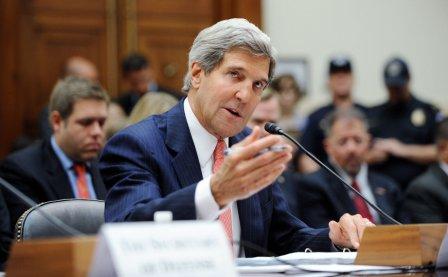Sorting out Syria’s Chemical Attacks

Secretary of State John Kerry (MCT)
Russian proposal halts military response
On August 21 over 1,000 lives ended when an artillery rocket hit a rebel controlled Damascus suburb called Ghouta, releasing a nerve agent called sarin. This is the latest development in a two and a half year civil war that, according to the Syrian Observatory for Human Rights, has killed at least 110,000 people.
On September 16 the Secretary General of the United Nations, Ban Ki-Moon, confirmed that a UN mission in Syria found evidence that sarin was used. This evidence included rocket fragments laced with sarin, a number of interviews with health care workers on the scene and survivors, and samples taken from 34 survivors that according to the report gave “definitive evidence of exposure to sarin by almost all of the survivors.” Sarin is a colorless, tasteless, odorless, quickly evaporating liquid that can cause death within 10 minutes after being inhaled.
According to Fox News, these findings are “the first official confirmation by scientific experts that chemical weapons were used in Syria’s civil war.” BBC News also reports that Secretary General Ban Ki-Moon has called the attack a “war crime,” and that it was “the most significant confirmed use of chemical weapons against civilians since Saddam Hussein used them in Halabja (Iraq) in 1988.”
The Syrian government and its supporters have claimed that it was not behind the attacks saying that the rebels launched the chemical weapons in an attempt to garner international sympathy. Additionally the Syrian government has admitted that it does, as long suspected, have chemical weapon stockpiles. Major western governments, like that of America, Great Britain, and France, have remained adamant that Syria’s government is to blame. After the attack President Obama called for Congress to authorize a military strike against Syria. A similar proposal in British Parliament was struck down by its members.
Enter Russia – On September 9 they announced a proposal for removing and destroying Syria’s chemical weapons and avoiding military confrontation with Russia’s ally in Syria at the same time. This proposal prompted the President to postpone a vote on military action. After much discussion in Geneva, a framework was agreed upon by Secretary of State and former Massachusetts Senator John Kerry and Russian Foreign Minister Sergey Lavrov on September 14. Syrian President Bashar Al-Assad has voiced his willingness to cooperate.
According to this agreement, the U.S. and Russia will ask the Organization for the Prohibition of Chemical Weapons (OPCW), the international chemical weapons watch-dog group, to approve and verify procedures to destroy Syria’s chemical weapons program. Additionally the agreement calls for an inventory of said arsenal to be submitted by Syria to the OPCW by September 21, which they complied with, leading to the destruction or removal, if possible, of Syria’s entire chemical weapons program by the middle of 2014.
Currently the U.S., Britain, and France are working to turn Russia’s proposal into a U.N. resolution. In an interview with Fox News from September 19, Syria’s President Bashar Al-Assad said that it would take $1 billion and at least a year in order to remove Syria’s deadly stockpile. Both Syria’s bloody civil war and its chemical weapons crisis will likely continue to be a hot button issue for time to come.

Ian MacLeod is a member of the class of 2016. He joined the Green Wave Gazette his freshman year and became the Associate Editor as a sophomore and Editor-in-Chief...
